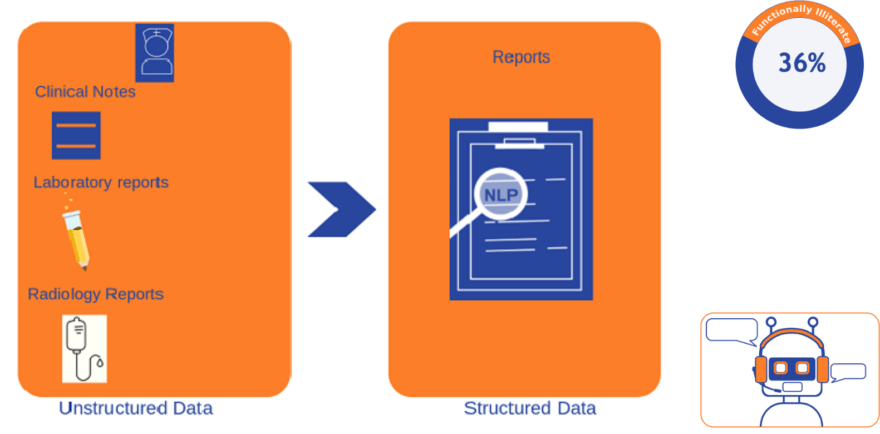Healthcare industry needs technology advancements to maintain value-based care for every patient. One of the best applicable technologies is Natural language processing (NLP). The most useful application of NLP technology in the healthcare industry is clinical documentation. It includes patient report status, past and present medical history, symptoms, and diagnoses. Natural language processing in healthcare industry can help in transforming raw data into meaningful insights to improve healthcare outcomes.
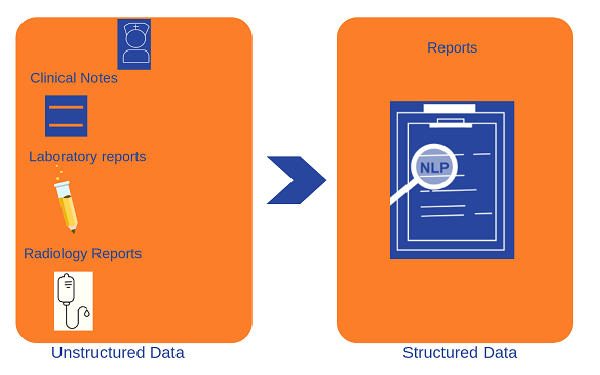 Natural language processing could be broadly described as the processing of a computer algorithm to identify and extract information from unstructured data, like speech or written text and summarize the this information into structured data.
Natural language processing could be broadly described as the processing of a computer algorithm to identify and extract information from unstructured data, like speech or written text and summarize the this information into structured data.
Some of the tasks that NLP can perform are:
- Summarizing lengthy unstructured clinical notes
- Mapping useful data from unstructured data into structured data in electronic health records (EHR)
- Converting data from machine-readable formats into natural language for reporting and educating
- Answering text queries through natural language interface
- Optimize the images into meaningful insights and reports
NLP in Electronic health record (EHR)
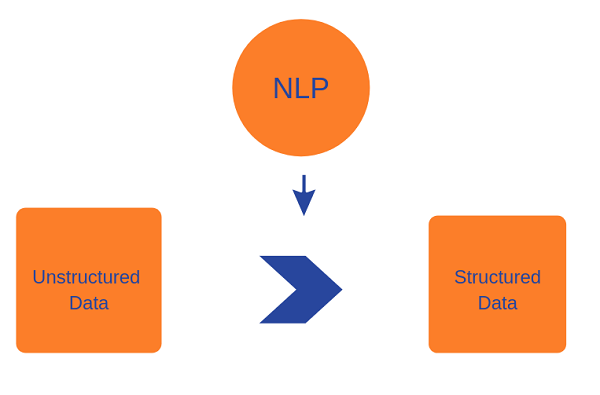 NLP operates on the unstructured data into structured data, interpreting large volumes of data, and generating actionable insights. According to this information, one of the most applicable NLP technologies in the healthcare industry is Electronic health records (EHR). An electronic record holds huge amount of data of a patients medical history. It includes demography, age, laboratory data, radiology reports, problems of diseases, medications, and past medical history in the form of unstructured data. An NLP application processes this unstructured data into structured data, analyses and summarizes the data to generate actionable intelligence.
NLP operates on the unstructured data into structured data, interpreting large volumes of data, and generating actionable insights. According to this information, one of the most applicable NLP technologies in the healthcare industry is Electronic health records (EHR). An electronic record holds huge amount of data of a patients medical history. It includes demography, age, laboratory data, radiology reports, problems of diseases, medications, and past medical history in the form of unstructured data. An NLP application processes this unstructured data into structured data, analyses and summarizes the data to generate actionable intelligence.
NLP technology also saves time for clinicians by visualizing the patient’s data in the form of charts, so clinicians can easily grasp the data easily and spend more time on patient care. The NLP technology can help healthcare providers in enhancing the quality of treatment provided to patients by giving quick access to patient records and thereby, diagnose the patients more effectively and efficiently.
NLP can help patients improve their health literacy
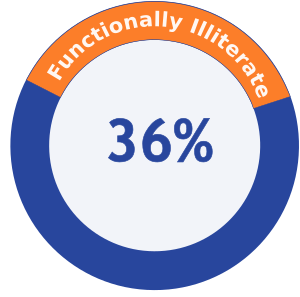 In their 12th annual report to the Secretary of US department of Health and Human services, the advisory committee on training in primary care medicine and dentistry found that more that 36% are health illiterate. And, it increases the cost of healthcare by 10,688$. Most of the individuals are not able to understand medical terms, medical records and clinical notes of the physicians. This limited health literacy can stop the patients from taking healthcare benefits and medical decisions. To address this problem, every individual should become health literate.
In their 12th annual report to the Secretary of US department of Health and Human services, the advisory committee on training in primary care medicine and dentistry found that more that 36% are health illiterate. And, it increases the cost of healthcare by 10,688$. Most of the individuals are not able to understand medical terms, medical records and clinical notes of the physicians. This limited health literacy can stop the patients from taking healthcare benefits and medical decisions. To address this problem, every individual should become health literate.
Natural language processing in healthcare industry could play an important role in educating patients on health literacy. Health literacy is the key point for the patients to take accurate health decisions on time. Every individual has to acquire, exercise, and perceive primary health information to make accurate health decisions. NLP applications can help the patients in understanding their symptoms and pain by accessing health information to make a medical decision.
NLP can help in reducing healthcare costs
In the traditional healthcare system, extracting clinical data and determining the prolonged treatment plan to diagnose patient disease leads to higher healthcare costs. So using NLP technology the clinician easily collects critical data quickly and accurately.It reduces the errors in the documentation and healthcare providers can make decisions on time. Further, NLP technology reduces the operational costs of healthcare organizations
NLP can help the physicians to spend quality time with the patients
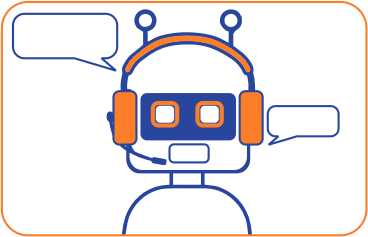 In a study, it was found that 2 hours are spent by physicians on documentation compared to 1 hour tending to patient. In the traditional healthcare system, physicians spend more time on documentation than spending time with the patients. Most of the time spent on documentation is repetitive. These repetitive tasks can automated by using advanced NLP technology like chatbots or virtual nurse assistants. These chatbots can remove the repetitive work burden from healthcare staff and saves time that could be better spent on providing care to patients. The chatbots can send reminders to take medication ; make appointments with concerned doctors, and handle documentation requests
In a study, it was found that 2 hours are spent by physicians on documentation compared to 1 hour tending to patient. In the traditional healthcare system, physicians spend more time on documentation than spending time with the patients. Most of the time spent on documentation is repetitive. These repetitive tasks can automated by using advanced NLP technology like chatbots or virtual nurse assistants. These chatbots can remove the repetitive work burden from healthcare staff and saves time that could be better spent on providing care to patients. The chatbots can send reminders to take medication ; make appointments with concerned doctors, and handle documentation requests
In traditional healthcare system, physicians are spending more time on the documentation activities, like billing and regulatory procedures. While most of these activities are mandated by law, nevertheless, all these activities reduce physicians time in attending to patients. The natural processing technology can automate such backend tasks like documentation, reporting, and billing and present them to the physician for final approval. Also, the NLP technology helps the physicians in unlocking useful data. In the current scenario, physicians do not get useful data at the time of need because of the way data is stored in unstructured formats, like improper clinical notes etc.. Using natural language processing in healthcare, physicians can gather all possible insights from such unstructured data just-in-time and can take accurate patient care decisions.
As I see foresee, natural processing technologies could become a backbone for the healthcare industry in the way of making accurate decisions and thereby, enhance the overall quality of healthcare provided to the patients.

